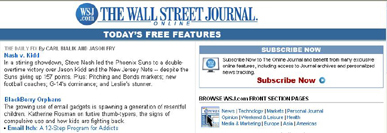WSJ targets bloggers to build brand

Gordon Crovitz, Publisher, the Wall Street Journal, noted the strategic importance of WSJ.com’s “Free Today” in his presentation last week at the paidContent mixer in NYC (see “Crovitz on WSJ: 80-20 editorial rule in 2007”).
What is the history behind the “Today’s Free Features” section? How does “Free Today” impact sales of paid subscriptions?
I spoke with Bill Grueskin, managing editor, Wall Street Journal online, to find out.
“Today’s Free Features” developed out of a WSJ outreach program towards political bloggers which began during 2004 election coverage, Grueskin told me. One political story a day was selected to bring from behind the wall and share with bloggers.
The initiative “received a lot of traction,” according to Grueskin. Many political bloggers linked to the daily free political stories in their posts.

The WSJ has expanded from one free political story a day to several stories daily in diverse sectors and sends out notification of the free stories to bloggers.
Grueskin underscored that the “Free Today” program is “not a marketing ploy,” but an "effective way" of buidling brand recognition and of increasing exposure.
Does the “Today’s Free Features” offering spur more sales of the subscription product? “Hard to say,” Grueskin said.
One measure of success of the blogger out-reach program is the number of inbound links the free story selections receive.
The recent Peanut Butter Manifesto memo garnered more than 500 links from blogs, marking it among the most sought after selections in the free program.
I asked Grueskin if the WSJ would be reaching out even more to bloggers.
Is full, complimentary, subscription access to WSJ.com for bloggers a possibility? Grueskin did not express enthusiasm for such a prospect.